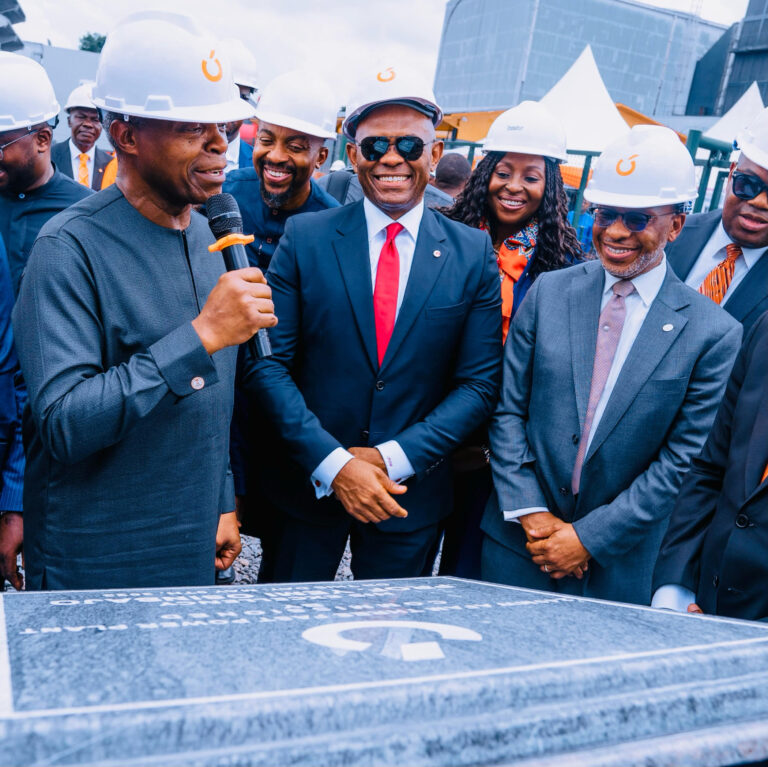•Says Electricity Revenue Hit N80bn Monthly In 2023Q1
Caption: Vice President, Yemi Osinbajo making a remark at the commissioning of Transcorp Afam 3 Fast Power 240MW turbines in Afam, Rivers State on Tuesday, while Group Chairman, Transcorp Plc, Tony Elumelu (second left); President/GCEO, Transnational Corporation Plc, Dr. (Mrs) Owen Omogiafo (second right); and, Director-General, Bureau of Public Enterprises(BPE), Alexander Okoh (right), listens with rapt attention.
Vice President Yemi Osinbajo, on Tuesday, commissioned the Transafam Power Limited, one of the power subsidiaries of Transnational Corporation Plc’s 240MW Afam Three Fast Power plant, an electricity generating plant located in Afam, Okoloma Village, in Oyigbo LGA of Rivers State, on behalf of President Muhammadu Buhari, bringing the plant’s cumulative generating capacity to 1,000 megawatts of electricity.
The Commissioning of Afam Three Fast Power plant came a day after the presentation of the Discharge Certificate to Transcorp Power Limited by the Vice President and Chairman of the National Council on privatization (NCP) in a ceremony held at the presidential Villa Abuja, following the fulfilment of all privatisation conditions set by the Bureau for Public Enterprise (BPE).
Speaking at the occasion, Osinbajo lauded the Chairman of Transcorp Group, Tony Elumelu and the entire Transcorp team for yet another power sector investment after an acquisition cost of N105.3bn, noting that the project “is an important part of the evolving story of Nigeria’s aspirations to bring electricity to millions in their homes, factories and businesses that provide their livelihoods. It brings into view the importance of private capital in building up capacity along the power value chain.”
A major weakness of Nigeria’s privatisation process, he continued, “has been inadequacy of private investments and new cash injections. But the tide is turning with indigenous power and private investors such as Transcorp Power and Heirs Holdings, making significant investments such as the 100% acquisition of the 966MW installed capacity in Afam Plc and Afam III fast power Limited jointly referred to as Afam Genco”
According to him, sustaining the significant strides made by the Muhammadu Buhari administration in the electricity sector with increased investments and improvements in the value chain, Nigeria could become one of the best power markets in the world.
“We have all the ingredients to create one of the best power markets in the world. I am also confident it will happen within our lifetimes.

Caption: Vice President, Yemi Osinbajo and Group Chairman, Transcorp Plc, Mr. Tony Elumelu; during the commissioning of Transcorp Afam 3 Fast Power 240MW turbines in Afam, Rivers State
The challenge before the country now, he stressed, “is for the industry to leverage the improved commercial environment that has been created to sustainably supply electricity and improve service to all citizens. This administration has made significant strides in this direction.”
Referencing the efforts of the administration in the sector, the VP said “the complete story is that in the past few years we have seen more new money coming into the power value chain.
“These transactions include, Quest PLC that became core investor in Yola disco in 2020 with the transaction worth N19bn.
“Last month the National Council on Privatization, NCP, approved the 30-year concession on Zungeru Hydro Power Plant at $70m a year. And overall, the story of the Nigerian electricity supply industry is also getting better.”
Continuing, the VP disclosed that “since 2020, the Nigerian Electricity Regulatory Commission has executed all of its bi-annual review processes without fail,” recalling that this was a marked difference from the past.
For instance, he said “in 2019 subsidies reached a peak of N584bn in an environment that was very burdensome on the Nigerian Government’s fiscal position.”
But he added that the “introduction of the Service Based Tariff, the Payment Discipline initiative for the sector (through Nigerian Electricity Regulatory Commission and Central Bank of Nigeria) and the introduction of the National Mass Metering programme have led to a doubling of market collections in the Nigerian Electricity Supply Industry from N40bn per month in 2020 to a record of N80bn per month in the first quarter of 2023.”
He also stated that in 2021 and 2022 “five underperforming DISCOs (electricity distribution companies) were brought into a restructuring programme that has led to a N10bn per month reduction in shortfalls. If this trajectory continues, the Nigerian Electricity Supply Industry will attain self-sufficiency by the end of 2023.”
Speaking further, Osinbajo noted that the Buhari administration has created programmes “for off-grid electrification and revamped the Rural Electrification Agency, such that it now has first rate capacity to provide renewable and off-grid electricity supply.
“This administration has also completed and concessioned the Zungeru Hydroelectric power plant that will add 700MW of renewable energy to our energy mix. We believe we are on track to electrify all Nigerians in the next decade as we look forward to the next administration scaling up already existing programmes.”
According to the VP “the last few days, I must say belong to Transcorp Power because at the same meeting of the NCP the council approved Transcorp Power consortium as preferred bidder for the acquisition of the Abuja DISCO.”
Besides Transcorp Power, the VP commended the efforts of “the Rivers State Government and the Afam Paramount Ruler and communities adjoining Afam for working constructively with the power companies to ensure continued peace and security in the Afam Cluster, without which we wouldn’t be here today commissioning this project.”
He also commended General Electric “for its continued investments and partnership in Nigeria to improve our electricity industry,” while also adding the DG, the entire BPE team and the National Council on Privatization for another successfully completed transaction.
Prof. Osinbajo however noted that the country “will not make progress if our industrial and urban power supply that is anchored on large scale gas power plants does not improve. Despite having one of the largest gas reserves in the world, the gas supply and security for the power sector has remained inconsistent and is hampering reform efforts.”
He further stressed that payment security to gas suppliers remained one of the greatest challenge to electricity supply and encouraged “Gas Power Producers and gas suppliers to have a fundamental re-think about supply security and proffer ways to ensure our gas power supply base can improve and meet the gap and growing demands of the Nigerian Electricity Supply Industry.”
Earlier in his remarks, Rivers State Head of Service, Dr. Rufus Godwin, who represented Gov. Nyesom Wike, thanked the Vice President for his love and commitment to the wellbeing of Rivers people and Nigerians at large, stating that “the VP has become a son of Rivers and is welcome to the State anytime.”
He equally thanked the Federal Government for Afam Power Project, noting that besides being host to a number of Federal Government projects, “Rivers State is a business hub in the country and contributes 40% of electricity to the country.”
In the same vein, the Group Chairman of Transcorp Plc, Tony Elumelu, praised the Federal Government, President Buhari and Vice President Osinbajo for their unflinching support to the power sector and for seeing to the completion of Afam Power Project.
He noted that has not been an easy journey completing the Afam Power Project, which would connect one million households in the country to electricity.
Also speaking, the President of General Electric in Nigeria, Muhammed Mijindadi recalled how on some difficult occasions in the process of delivering the project, the US-based company sought the quick interventions of the Vice President, who “promptly intervened several times.”
He added that there were times when things were proving rather difficult, applauding the VP, Mallam Abba Kyari, the late Chief of Staff to the President, the BPE, Ministers of Power and Finance for their support.
General Electric supplied the mobile power generating equipment to the Afam 3 Power Plant, provided the electrical balance, installation, commissioning services and training to the plant operators.
Dignitaries at the event were the Permanent Secretary in the Ministry of Power, Temitope Fashedemi, who represented the Minister, and the Director General, BPE, Alex Okoh, among other officials.
The Minister of Power, Engr. Abubakar Aliyu applauded Transcorp Group for its positive contributions to improving electricity generation in Nigeria, stressing that the occasion is a celebration of “an exemplar of the best of Public-Private partnerships. This collaboration has ensured that we are commissioning Afam Three Fast Power today, with a capacity to inject an additional 240MW of electricity into the National grid.
“At full capacity, it will no doubt provide about 40% of our generated energy today. This is commendable and will certainly improve electricity supply to the nation along with growth of our economy and Gross Domestic Product (GDP)”, Engr. Abubakar said.
Elumelu noted the importance of power in Nigeria, “we all experience the consequences of our power deficit – the implications for our people, our businesses, our schools, hospitals, and institutions – our national destiny. Transcorp Group is a key player in the power sector. We recognise power is the single most critical factor to lifting our people out of poverty and enabling job creation.”
The commission, he added, is a fulfilment of “our promises to the Government and demonstrating Transcorp’s purpose of “Improving Lives and Transforming Africa”.
The Director General of the Bureau for Public Enterprises, Alex Okoh highlighted the importance of projects such as these in improving access to electricity in Nigeria, adding that the “Afam Three fast Power combined with the adjoining Afam Power Plc, will in the next few years add almost 1,000MW of electricity to the national grid.
“This will go a long way towards reducing the current power deficit while enhancing access to electricity for millions of private and corporate Nigerians, creating jobs, and ensuring the socio-economic development and well-being of the nation.”








